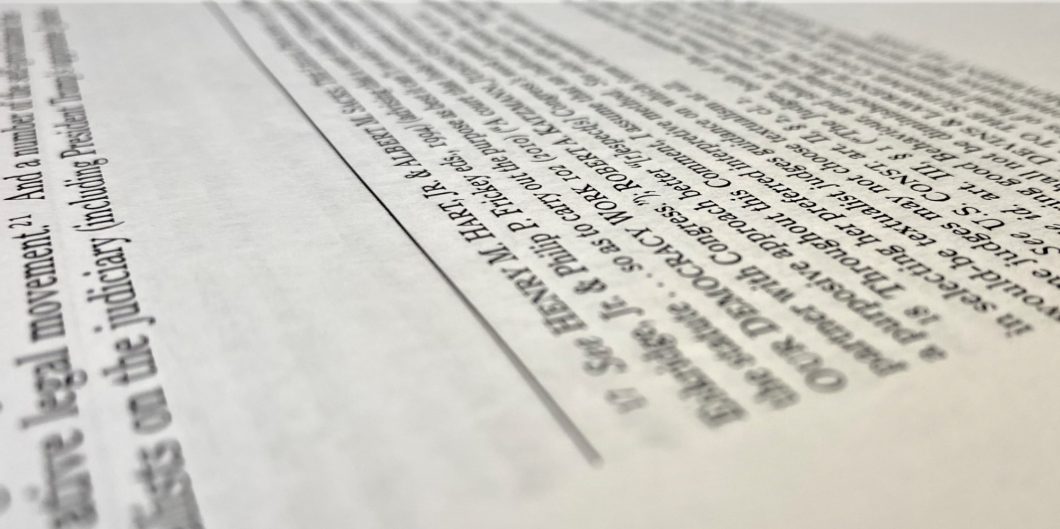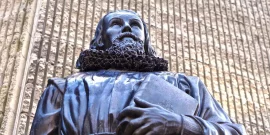Today, it does not suffice tell people they have souls, they must come to believe it by certain experience—and Christopher Nolan offers this.
Is Scholarship the Foundation of Freedom?
Do you associate scholarship with freedom? No? Neither do I. I’m more likely to associate scholars and their scholarship (I include myself here) with Faust’s description of his tedious assistant Wagner as “the dry creeper” than with freedom. Geoffrey Galt Harpham, the longtime director the National Humanities Center and current senior fellow at the Kenan Institute for Ethics at Duke University, disagrees. Despite the mindless conformity betrayed by a perusal of almost any academic journal and the ideological groupthink superintending vast swaths of the humanities and social sciences, he wants to argue, in Scholarship and Freedom, that the two are intimately connected. In fact, he claims that while the “immediate goal of scholarship is to produce knowledge, the real project concerns human freedom.” How persuasive is his argument? Not very. It’s actually difficult to describe his book as presenting an argument. Instead, it’s more like a meandering meditation on how the two might at some points intersect based on some biographical reflections on the lives of W.E.B. Du Bois, Bernard Lategan, and Linda Nochlin. At the end, you’re left feeling that the whole is much less than the sum of the parts, if it adds up at all.
Confused and Confusing
Understanding Harpham’s case first requires figuring out what he means by scholarship and freedom, and then looking at the evidence he marshals to buttress his claims. He uses both in fairly slippery ways. “Scholarship” is the clearest one, but even that he admits to defining in “very loose terms.” It is, he says, “an argument about human activity based on a critical examination of evidence.” Like he said—loose. Here’s his attempt to flesh it out: “Modern scholarship is a historically and culturally specific activity that grows out of and supports concepts of personal and political autonomy, responsibility, and accountability.” Things don’t really improve except for his claim that “science and scholarship” are not the same. Science, he says, requires specialized training to understand, but scholarship is accessible to the “non-scholar” and “offers itself ultimately to the human community as a contribution to human self-understanding.” I would actually offer this book as an example of how much contemporary scholarship is not in fact accessible to the non-scholar.
Now that we haven’t cleared up the meaning of scholarship, let’s turn to “freedom” or the radical freedom that he contends grounds scholarship. Almost impossibly, things get even more opaque. Never does he provide a succinct definition of what he means by freedom. Since people have been arguing about this for a long time, this absence is peculiar. Instead, he seems to offer a range of definitions of freedom including emancipation (that’s on the publisher’s page so I take it as authoritative), the capacity to create, rejecting the status quo, social and economic mobility, and just overall being disruptive. One could imagine someone arguing for these as being the true meaning of freedom but one could just as easily imagine arguments to the contrary. Think about emancipation. That’s what Thomas Hobbes described in chapter 13 of Leviathan, but based on Hobbes’ description, radical emancipation would have few takers, what with all the killing and life being solitary, poore, nasty, brutish, and short. Absolute freedom turns out to be absolutely useless freedom. It would have been nice to see some defense of any of these definitions, but none are to be found. In short, if you don’t establish a defensible definition of freedom, you can’t establish a connection between scholarship and freedom.
But let’s imagine that these terms have been adequately defined. Are they connected? Here’s his case. First, the very existence of a work of scholarship “testifies to the fact that the author enjoys the freedom to determine one’s own ends or projects.” This is true but banal. Second, modern scholarship grew out of the European Enlightenment, “a philosophical movement predicated on freedom as the key concept in morals, politics, and aesthetics.” Highly contestable, but ultimately it doesn’t matter without a coherent understanding of freedom.
Third, “at the core of scholarship is an assertion of freedom in conditions of chosen constraint, with the implication that the constraints, because they are chosen, confer weight and authority on the assertion.” Best as I can tell, this means that scholars submit to disciplinary norms that lend legitimacy to their conclusions. Again, it’s not clear what that has to do with freedom. In fact, subtract “assertion of freedom” from that sentence and you probably don’t lose anything. But maybe things will improve with his discussion of Du Bois, Lategan, and Nochlin. He claims that “each one faced at some point in his or her career an opposing edifice of conviction, and each deployed the instruments of scholarship in the service of an emancipatory agenda.” Does the evidence he marshals support his thesis? At some broad, trite, imprecise level you could say yes. A closer look though, shall we say, complicates the narrative. After all, he admits that “freedom meant different things to these scholars.”
The Lives of the Scholars—and Footnotes
Du Bois is the individual who makes the most sense out of all three since, as Harpham says, his scholarship had an explicitly “political agenda.” Du Bois, particularly through Black Reconstruction in America, countered the dominant narrative among historians that reconstruction was a failure because blacks were unfit for freedom. In contrast, Du Bois argued that newly freed slaves showed remarkable economic and political ingenuity and ability. An accurate accounting of the facts proves the opposite of the what the notorious Dunning School claimed. Thus, scholarship, when practiced objectively, argues for liberty. Of course, Du Bois’ biography, as Harpham admits, complicates this narrative of freedom. Later in life, he became a committed communist, wrote a fawning essay about Joseph Stalin after his death, supported the Soviet suppression of the Hungarian uprising, and palled around with Mao.
Bernard Lategan is a South African New Testament scholar who became a critic of apartheid. Harpham notes that South African religious scholars were expected to justify the apartheid regime and many theologians did so with great enthusiasm. They argued that while the church was a single community in Christ that within that unity there could be diversity, diversity which conveniently sanctioned apartheid. Lategan initially endorsed this view but over time changed his mind and changed his interpretation of the Bible. So far so good.
In his concluding chapter, Harpham claims that “tyrants fear being outlived by footnotes.” I’m pretty sure they actually fear being killed by their enemies.
Things get a bit messier when we find out the nature of Lategan’s road to Damascus experience. According to Harpham, Lategan became engaged with “Continental hermeneutics” and his writings started drawing on Jacques Derrida, Hans Robert Jauss, the Prague School, pragmatics, reception theory, and Paul Ricoeur. Oh dear. One should, of course, be suspicious of any non-contemptuous reference to perhaps the greatest intellectual charlatan of the 20th century, Derrida. And the influence of Ricoeur actually undermines the very positions that Lategan came to support. According to Harpham, Lategan took from Ricoeur the idea that texts are “invitations to creative reading extended to anyone who could make a good-faith effort at understanding. The guarantor of validity in interpretation was not conformity to scholarly consensus but the good faith in which the effort was made.”
This is nonsense. Many people can have good faith interpretations that are manifestly wrong. I’m thinking of a student from many years ago who in perfect good faith argued that Plato was a democrat. Even more problematically, when that is the standard for validity, the Biblical interpretations of apartheid supporters become just as valid as Lategan’s. After all, they surely would contend that their interpretations were made in good faith. Lategan himself did so early in his career! Nonetheless, one can at least see some connection to Harpham’s thesis since apartheid could hardly be considered a freedom-advancing regime. It’s just a shame that Lategan’s conversion came via Continental theory which makes his position self-defeating. Freedom, however one defines it, can only be morally compelling if its claims are true, and the Continental theorists want us to get beyond such metaphysical fundamentalism.
The chapter on Linda Nochlin is the most perplexing. Nochlin was an American art historian who became a prominent feminist art historian. Like the previous chapters this one contains a not very clear biography of Nochlin that’s interspersed with lengthy digressions on tangential topics ranging from Hannah Arendt to the use of footnotes which seem to be primarily geared toward settling scores. Consider his tirade against the footnote:
The most hateful, risible, off-putting vermiculate feature of scholarship. The fine print hideaway for caution, boasting, temerity, ass-covering, and intimidation. The ramifying fungal system of a disease of scholarship, the death-drive of knowledge, a dark and airless basement for castoffs and junk, the swarming anthill of micro-disputation, the Great Dismal Swamp of irrelevance, the graveyard of readerly interest, eloquent evidence of a wasted life spent in the pointless pursuit of the not-worth-pursuing. A crushed but rebellious force whose mad ambition is plainly to rise up and crowd the “main” (read: entitled) text off the page altogether so that recto and verso are all note, a sublime result approached only by a few geniuses (Friedrich Nietzsche, On The Genealogy of Morals, F.A. Wolf, Prolegomena to Homer), and inspired parodists (David Foster Wallace, Infinite Jest). An anti-Mardi Gras inversion where unashamed pedantry overthrows and mocks the vulgarly populist argument. Who’s in charge now, professor? All the eyesore forms taken by the scholar’s secret desire to leave the world, go underground, burrow in among the worms, insects, and rodents, and stay there without having resolved the question or advanced the issue.
Anyone who’s slogged through a law review article with a footnote to text ratio of 4:1 might share his sentiments. But ultimately this seems overblown and the poor footnote collapses under the ponderous weight he puts on it. Maybe, just maybe, the primary function of the footnote is for the reader to be able to consult the source. I kind of like them. They are certainly preferable than the barbarous endnote, and we don’t need to even mention that enemy of civilization, parenthetical notation. In fact, I think his book should have used footnotes instead of endnotes so that I could easily assess his evidence. It’s far easier to make grandiose claims if the reader has to go rooting around at the end of the book to find the relevant sources. And rather than being repellent to the eye, I find them a welcome relief when you’re slogging through a pedantic exposition of no clear importance or limited connection to the truth. But whatever one thinks of the footnote, he never gets around to clearly explaining how it’s connected to Nochlin. Only in his concluding chapter does he claim that “tyrants fear being outlived by footnotes.” I’m pretty sure they actually fear being killed by their enemies. We’ve known this since Xenophon wrote Hiero.
Nevertheless, the chapter wanders back to something resembling his thesis when he claims that Nochlin “seems to regard scholarship as a more emancipatory force for women than feminism.” It’s hard to know if that’s actually Nochlin’s position. After all, he said “seems” and the quotes he provides from her don’t confirm his assertion. He says, apparently paraphrasing her, that “only scholarship is capable of correcting the intellectual distortions on which traditional social arrangements are founded.” Even if it does reflect her position, it’s another claim that desperately needs more evidence. If forced to choose, I suspect most feminists would trade all the volumes of feminist scholarship in the world for the birth control pill. But maybe Nochlin’s scholarship is as important for advancing the feminist cause as he says. What is it that she wants? According to Harpham, “she envisions an anarchically utopian ‘world upside down’ in which all normal relations of domination and hierarchy are overturned.” Harpham cites this approvingly and assumes that this advances freedom. I seem to recall the leaders of the French Revolution expressing similar sentiments.
After all this, Harpham himself seems to realize that he hasn’t quite delivered the goods. In his conclusion, he says, “the fortunes of the necessarily elite practice of scholarship and a more general political and social experience of freedom are if not directly linked at least related, and that they tend to wax and wane together.” That’s a dramatic comedown from his initial claim that the “real project” of scholarship “is human freedom.” Freedom likely does increase the amount of scholarship in the world. Whether that scholarship is valuable is a different question. Whether as a whole it advances freedom is a question Harpham’s volume leaves unanswered. To answer it, we need more scholarship . . . with footnotes.


